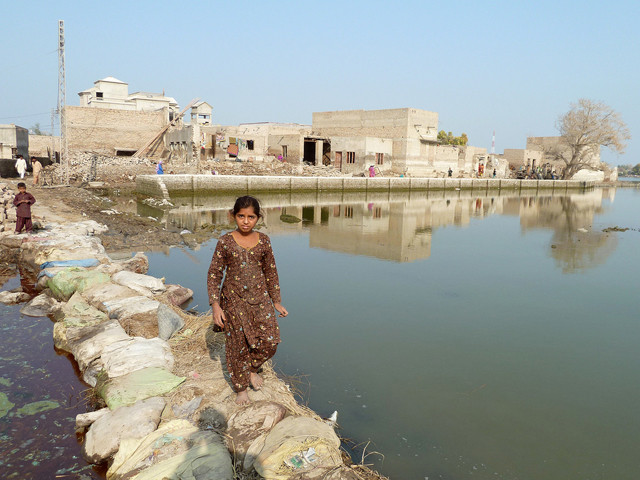Sanitation workshop: To fight runs, Pakistan in for tough run
Diarrhoea epidemic needs funding, concentrated efforts to be addressed.

Diarrhoea epidemic needs funding, concentrated efforts to be addressed. PHOTO: DFID/ FILE
The partners in improving water and sanitation have fulfilled their responsibilities. Now, the ball is in the federal and provincial governments’ court. They must protect the lives of 320 children, dying every 24 hours from diarrhea caused by contaminated water and poor sanitation.
This was said by the speakers at the inaugural session of a two-day workshop organised by the United Nations Children’s Fund (UNICEF) and the World Bank Water and Sanitation Programme (WSP) on Monday at a local hotel.
The objective of the workshop is to form synergies for achieving sanitation-related Millennium Development Goals (MDGs) in Pakistan and provides a platform to government, semi-government and non-government partners to share experiences in developing and implementing various programme models under the Pakistan Approach to Total Sanitation (PATS). The workshop will also deliberate on the agenda for upcoming events on sanitation including the South Asian Conference on Sanitation (SACOSAN V) and Pakistan Conference on Sanitation (PACOSAN II).

The speakers said that water and sanitation related disease is responsible for some 60 per cent of the child mortality rate in the country and eight per cent of them die totally unnecessary from preventable diseases.
UNICEF Representative in Pakistan Dan Rohrmann said, “Diarrhea triggers a cause-and-effect chain with tragic results as it is linked to malnutrition, which accounts for more than half of all under-five deaths.”
He said the economic impact is also scary, as water, sanitation and hygiene-related diseases costs Pakistan’s economy billions of rupees every year.
“I believe the negative impact on gross domestic product (GDP) is between four and seven per cent. This should make any finance minister interested as few better investment opportunities exist,” he said.
Rohrmann said Pakistan requires necessary investment and support for the development of the water and sanitation sector.
Simone Klawitter, UNICEF’s chief water, sanitation and hygiene (WASH), said, “Pakistan cannot eradicate polio until it improves its poor sanitation condition.”
“The provinces should take the poor sanitation issue seriously and allocate enough to address this most neglected sector,” she said.
Masroor Ahmed, WSP senior water and sanitation specialist, said “Sanitation has always remained a neglected sector, and inadequate sanitation causes Pakistan economic losses totalling US$ 5.7 billion or Rs 343.7 billion each year.”
Said Rehman, KP WatSan Cell coordinator, informed participants that the past five to six years have seen a five-fold increase in the budget allocation, but there is still a Rs 40 billion annual resource gap to achieve MDG targets.
He said analysis suggests that provincial allocations should be doubled to 10% of the annual development programme (ADP) and overall investment to 0.3% of GDP.
“Poor sanitation, hygiene and lack of safe drinking water trigger a downward slide into poverty,” said MNA Maryam Aurangzeb.
Published in The Express Tribune, July 2nd, 2013.



















COMMENTS
Comments are moderated and generally will be posted if they are on-topic and not abusive.
For more information, please see our Comments FAQ